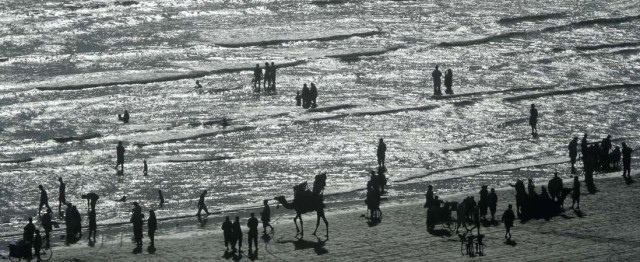Climate-resilient ecosystems: WWF-P launches project to help the govt and the country’s fishing population
The goal is to improve people’s ability to deal with climate change with minimum risks.

Many people in Peer Mohammad’s village are worried about their homes near the sea. Some are thinking of moving away because of the coastal erosion from the pounding waves and wind.
The increased tidal currents and variation have changed his life and that of others. If Peer Mohammad thinks of growing rice instead of fishing, the change in climate does not favour this either. “The elders say our village has been cursed,” he says with conviction.
For experts, these are all indicators of climate change. Pakistan’s coastline communities that make up almost one million people on Sindh’s coast and 250,000 on Balochistan’s are among the most vulnerable communities in South Asia.
Considering the condition, World Wildlife Fund-Pakistan (WWF-P) launched a project “Building Capacity on Climate Change Adaptation in Coastal Areas of Pakistan” (CCAP) in collaboration with WWF-UK and Lead Pakistan.
Funded by the European Commission, the project that started in January this year would start from Keti Bunder and Kharochhan in Thatta district and Jiwani in Gwadar, directly helping a fishing population of 15,000 to 20,000.
The project report says Pakistan needs to look find answers to major questions: how it will adapt to climate change and what will happen when coastal communities move back.
The overall project objective is that, “By 2025, coastal areas in Pakistan and neighbouring regions [will] have climate-resilient ecosystems to support the lives and livelihoods of coastal communities.”
Meanwhile, the short-term goal is to increase government and community climate adaptation capacity and strengthen water governance by 2015. It also aims at improving climate resilience of the Indus Delta ecosystem on which most coastal communities depend, supported by regional and trans-boundary cooperation on the adaptation at river deltas.
“We basically aim to improve people’s ability to cope with climate change by reducing their risks,” explained Khadija Zaheer, the project manager at WWF. The selected three locations are ideal to start work on adaptation and mitigation, she added. This will not only bring the vulnerable communities under the project’s sphere of influence but will also help the government.
The project intends to integrate the adaptation into different policies for each sector - environment, fisheries, water, local government, development etc. It will also work with the Friends of the Indus Forum to address water allocation (sharing mechanism of water) and lobby for sustainable flow requirements.
Zaheer told The Express Tribune that the communities on the coastline have observed changes like a shift in the rainfall patterns, rising sea levels, increased coastal erosion, tidal variation, temperature variability and heat effects on crops and harvesting. “We are also more vulnerable because the variation in temperature or pressure has increased the frequency of storms.” Hence, the activities of the project include intervention related to adaptation and building capability among vulnerable coastal communities - in addition to promoting integrated water resources management and river-basin management. The project also focuses on supporting governance mechanisms to become more responsive and robust when addressing climate variability and change-related impacts, said Zaheer.
The CCAP project will also conduct scientific and research-based studies on the field and develop a plan of action with the help of and for each locality. Climate adaptation plans will also be made, which will ultimately add to the government’s planning documents designed to respond to emerging climate risks and adaptation needs.
Published in The Express Tribune, June 15th, 2011.



















COMMENTS
Comments are moderated and generally will be posted if they are on-topic and not abusive.
For more information, please see our Comments FAQ